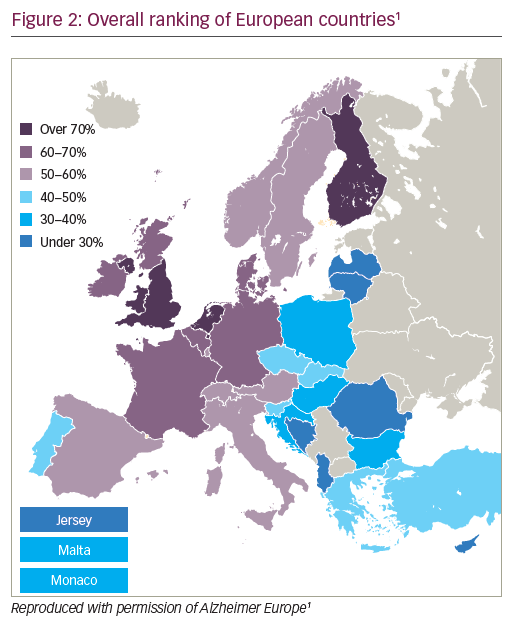I am delighted to introduce a new report from Alzheimer Europe highlighting the existing inequalities in access to dementia care and treatment across Europe. The report, ‘European Dementia Monitor 2017: comparing and benchmarking national dementia strategies and policies’, assesses which countries provide the most dementia-friendly policies and guarantee the best support and treatment of people with dementia and their carers.1
When I started working for Alzheimer Europe 20 years ago, there was little recognition that dementia constituted a public health challenge. Thanks to, for example, the campaigning of national Alzheimer associations and individual people with dementia and their carers, this has now completely changed. A contributing factor to the increased quality of care in most European countries is certainly also more research and extensive public education. Dementia is a major cause of disability and dependency among older people worldwide, having a significant impact not only on individuals but also carers, families, communities and societies.
Dementia is known to be more prevalent in an ageing population and by 2060 28% of the population will be aged over 65 years and 12% aged over 80 years.2 As Europe’s population ages, there will be an increase in age-related diseases and one of the most prevalent of these is dementia. In 2030, it is predicted there will be 13.4 million people in Europe living with dementia.3 In 2008, the cost per person with dementia was about EUR 22,000 per year, while it was somewhat lower for the wider EU sphere and for the whole of Europe. The total societal costs per case were estimated to be eight-times more in Northern Europe than in Eastern Europe.4
For the reasons above, Alzheimer Europe surveyed its national associations on the current state of care treatment research policies and law in the field of Alzheimer’s disease, in order to identify differences between countries as well as common trends and potential good practices and existing trends. The new report provides a benchmark of national dementia policies which compares and rates the responses of European countries to the dementia challenge. The survey covered all Member States of the European Union (with the exception of Estonia), plus Albania, Bosnia and Herzegovina, Jersey, Israel, Monaco, Norway, Switzerland and Turkey.
The European Dementia Monitor compares countries on 10 different categories, as follows:
- The availability of care services
- The affordability of care services
- The reimbursement of medicines
- The availability of clinical trials
- The involvement of the country in European dementia research initiatives
- The recognition of dementia as a priority
- The development of dementia-friendly initiatives
- The recognition of legal rights
- The ratification of International and European human rights treaties
- Care and employment rights
According to the findings of the European Dementia Monitor, no country excelled in all ten categories and there were significant differences between European countries.
Key findings:
- Finland scored highest on care availability and affordability, since it provided the most care services and ensured that these services were accessible and affordable for people with dementia and their carers.
- On treatment, Belgium, Ireland, Sweden, England and Scotland (United Kingdom) came first, as all anti-dementia treatments were fully reimbursed and the countries had a policy in place to limit the inappropriate use of antipsychotics.
- Germany, France and Spain scored highest in the clinical trial category, as it was possible for people with dementia to take part in all nine phase III clinical trials currently being conducted in Europe.
- Italy was the country that was the most committed to and active in European dementia research collaborations.
- Ireland and Norway came first in the recognition of dementia as a national policy and research priority.
- Finland, the Netherlands and England (United Kingdom) had the most inclusive and dementia-friendly initiatives and communities.
- Germany, France, Israel, the Netherlands, Slovenia, England and Scotland (United Kingdom) complied with Alzheimer Europe’s four recommendations with regard to respecting the legal rights of people with dementia and their carers.
- Finland and Norway had ratified the most International and European human rights conventions.
- Ireland came first with regard to the care and employment rights which are recognised.
On the basis of the findings in the 10 identified categories, Alzheimer Europe established a ranking of countries (with each domain contributing 10% to the overall score) with Finland coming first with an overall score of 75.2% followed by England (United Kingdom) (72.4%), the Netherlands (71.2%), Germany (69.4%) and Scotland (United Kingdom) (68.8%) (Figure 1).
There is still a clear East/West divide in Europe with most of the Western and Northern European countries scoring significantly higher than Eastern European countries (Figure 2). As a rule, countries with national dementia strategies scored better in all categories. It is time therefore that all European countries and in particular those in Eastern Europe recognise dementia as a national priority and develop national dementia strategies.


‘Our organisation has been lobbying for the recognition of dementia as a public health priority and called on European governments to develop national dementia strategies. The aim of the European Dementia Monitor is to asses which countries provide the most dementia-friendly policies and guarantee the best support and treatment of people with dementia and their carers.’ – Jean Georges, Alzheimer Europe














